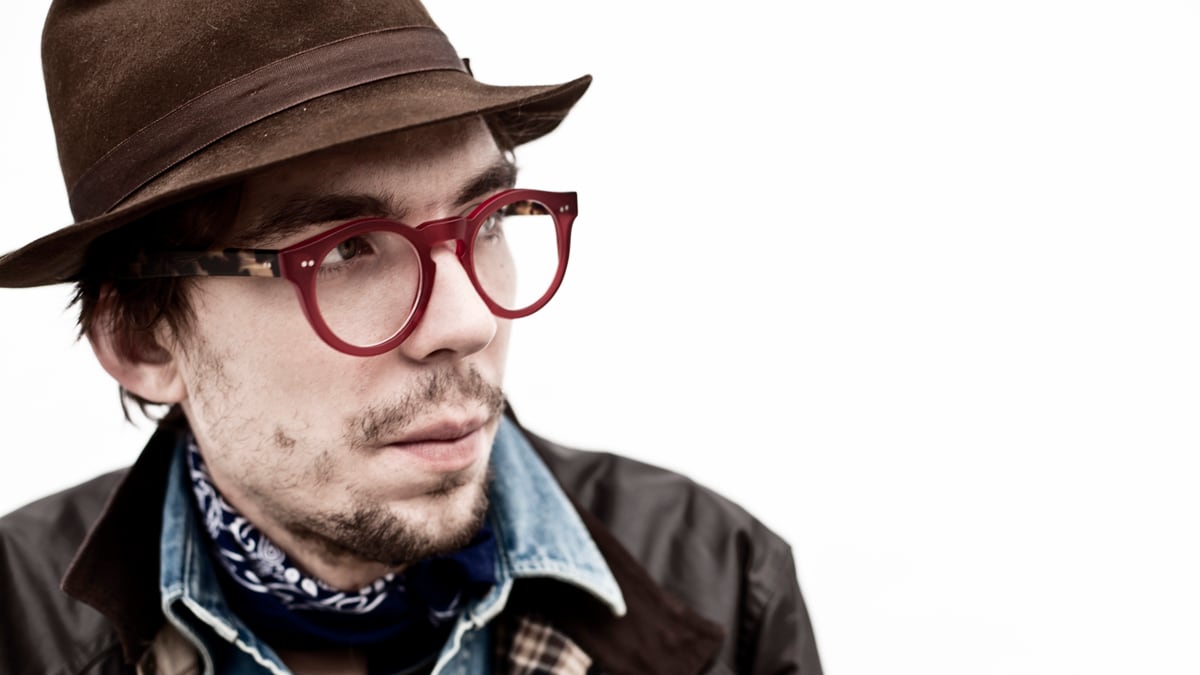The sound of his new album is a little simpler, and the lyrics are by a man who, instead of apologizing for his misdeeds, simply tells you he’s leaving. He’s known to fans as JTE, but even those who’ve never heard of him would probably recognize his last name. The son of Steve Earle and his third wife, Justin Townes Earle is the sort of musician a reporter would want to catch in a talkative moment. Judging by his life—battling addictions and, on rare occasions, the law—he probably has some good stories. But he’s grown up a bit since the tempered antics of years past, and the topic at hand is his new album, Nothing’s Gonna Change the Way You Feel About Me Now, out this week.
Earle seems to spend most of his time on tour, splitting the remaining moments between New York City, where he’s lived for years, and Nashville. His hair is a little wayward, and he’s just as tall and skinny in person as he looks on stage. He’s accessorized—with a turquoise ring on a right-hand finger and a several bracelets on his left wrist—which emphasizes the fact that his look has become part of his allure. GQ named him one of the most stylish men in the world not long ago, and he has ambitions to start a clothing line someday. He credits any sartorial sensitivity to his frame. “I’ve got a 27-inch waist. Before, I was stupid smaller,” he says. “Finding clothes in the South was impossible.”
His Southern boyhood comes up several times in our meeting, including when he explains the inspiration for the new album. “Growing up where I did, you had the Carter Family and the Staple Singers,” Earle says. “I discovered the same thing Gram Parsons did, that soul music and country music are practically identical. Based off of the same chord structures, and the songs are of heartache and loss. The main connection is they both came up in church.”
The assertion is telling, given that he recorded Nothing’s Gonna Change in a converted church in Asheville, N.C., where each song could be done in a single take. The idea was to replicate the energy of a live performance. “There’s a certain urgency that comes from the records of the early 60s before overdubbing and multitracking came into play,” he says. “I had more fun making this record, because there was so much riding on each take.” He also stuck to simple lyrics that center on the soul themes he mentions—heartache, loss, and guilt. As with all of Earle’s albums, aside from a few women’s names, there’s little in the way of story or plot, which leads to the feeling that he’s singing your lullaby or breaking your heart.

Should the trajectory of his previous albums continue, Nothing’s Gonna Change will best his previous works in both acclaim and sales. He’s not in Billboard territory (“I know I’m never going to be a big pop star, because I’m not willing to conform,” he says), but he has the type of fans that match their tattoos to his. His listeners are devoted, and that may be the closest thing to the promise of a long career that there is.
As the son of an established act, Earle is part of a pool of performers weaned on fame that seem to thrive on whatever pressures come with legacy. (See also: Hank Williams Jr., Hank Williams III, Shooter Jennings, Rosanne Cash.) “I did know that [having a famous father] was going to put my career from the start under a microscope,” he says. “But I thought, ‘People are gonna be watching so all I gotta do is come correct.’”
To be fair, the father he seems to have known the best was the absent one, not the famous one. He was raised by his mother, and though he toured with Steve as a teen, playing keyboard and guitar, drug abuse got him kicked off the bus. Addiction to heroin, cocaine, and alcohol continued to interrupt the proceeding decade, fueling a few nights in jail and causing him to cancel the latter part of his 2010 promotional tour for his fourth album, Harlem River Blues, and check into rehab for the 13th time. “For a long time I used my past as a reason to push myself to do all kinds of stupid things,” he says. “I don’t know that I have a particular vice. I just want more of everything.”
But again, he’s matured a bit since then. He talks about finding the right medications. He turned 30 in January. “I looked back and realized there were a lot of questions as to whether I’d make it out of my 20s. If you die in your 20s, you get tribute records. If you die in your 30s, you’re just stupid,” says Earle. “I definitely saw [my birthday] as me needing to get rid of the myths that I’d been living for a long time … the myths of the tortured musician.” He concedes that his girlfriend calls him a grown child, and he likes his morning cartoons. Ask him about The Simpsons and the evidence is on his face: he’s seen every episode of the series since its premiere in December 1989.
He leaves the next day for Massachusetts, the first stop on his tour to promote Nothing’s Gonna Change. He says he looks forward to the relative comfort of a tour bus, which is a change from the pickup trucks and passenger vans of previous tours. Once again he’s leaving New York, and once again he’s hoping for a better result than the last. As he sings on the album’s last song: “Thirty years of running has left me standing with my back to the cold, and it’s left me most days wondering if I’ve ever really learned a thing at all. But I’m trying to move on.”






